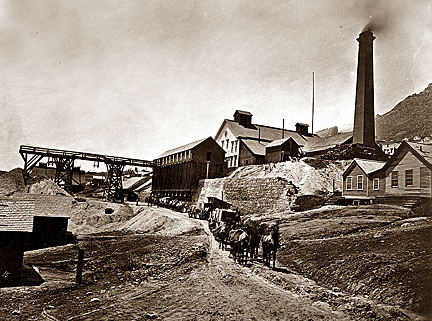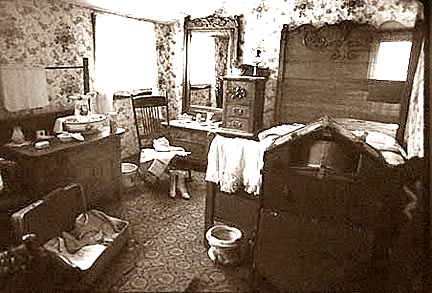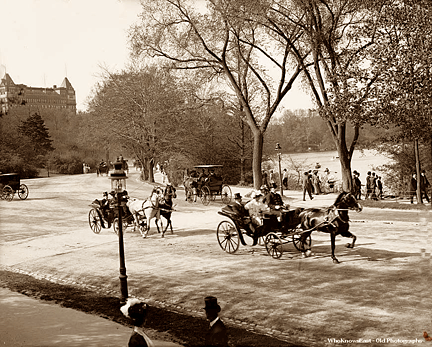|
 Twain
traveled through bustling Nevada mining towns by stage coach on his way to
San Francisco. The streets were crowded with quartz-wagons,
freight-teams, and other vehicles...There were military companies, fire
companies, brass bands, banks, hotels, theatres, dance-houses, wide-open
gambling palaces, political pow-wows, civic processions, street fights,
riots...wrote Twain. Twain
traveled through bustling Nevada mining towns by stage coach on his way to
San Francisco. The streets were crowded with quartz-wagons,
freight-teams, and other vehicles...There were military companies, fire
companies, brass bands, banks, hotels, theatres, dance-houses, wide-open
gambling palaces, political pow-wows, civic processions, street fights,
riots...wrote Twain.
Like
Virginia City, Nevada, South Pass, Wyoming, was one of those boom and bust
mining towns founded during the closing years of the golden era of the
Oregon Trail. At the time, people said it would rival Denver in its wealth,
importance and population. But, more importantly, it had a contract with the
Overland Stage Company to put its passengers up at the Idaho House, its only
hotel. Its walls are just two boards nailed together. Guests who stayed here
anytime other than July would wake up in the morning with ice on top of
their blankets. But it sure beat sleeping in the snow.
 As I peered into the rooms in these buildings, I saw the
real Old West. Here were the actual pieces of furniture and dishes that
Twain might have used when he stayed overnight on his way to California.
When I visited, I felt as if a time machine had transported me back to the
1860s. As I peered into the rooms in these buildings, I saw the
real Old West. Here were the actual pieces of furniture and dishes that
Twain might have used when he stayed overnight on his way to California.
When I visited, I felt as if a time machine had transported me back to the
1860s.
Twain
lived and wrote during the Gilded Age when the rich were very rich and the
poor very poor, a product of the Industrial Revolution in the 19th
Century. Though he may have started out as a young boy with a fishing pole
on the banks of the Mississippi, he rose to fame and fortune through
marriage and his work. But Twain disliked hobnobbing with the blue bloods.
He once wrote, "The whole atmosphere's full of money.... It cost
something to upholster these women from The Gilded Age."
 Eventually, Twain ventured abroad to lecture in the great
cities of Europe. By the time he had returned to America and paid off his
debts, he had become the country’s foremost celebrity. He was invited to
attend ship launchings, anniversary gatherings, political conventions, and
countless dinners. Reporters met him at every port of
call, anxious to print
a new quip from the famous humorist. To enhance his image, he took to
wearing white suits and loved to stroll down the street and see people
staring at him. Eventually, Twain ventured abroad to lecture in the great
cities of Europe. By the time he had returned to America and paid off his
debts, he had become the country’s foremost celebrity. He was invited to
attend ship launchings, anniversary gatherings, political conventions, and
countless dinners. Reporters met him at every port of
call, anxious to print
a new quip from the famous humorist. To enhance his image, he took to
wearing white suits and loved to stroll down the street and see people
staring at him.
But
when he wasn't traveling, he spent much of his time in his eight-sided
gazebo at his home in Hartford, Connecticut. Twain did much of his writing,
undisturbed, in the gazebo, the Victorian name for a small and secluded
summerhouse.
"When I find a well-drawn character in fiction or
biography, I generally take a warm personal interest in him, for the reason
that I have met him before–met him on the river."
<
Back to Special Features
Go to next special feature > |
